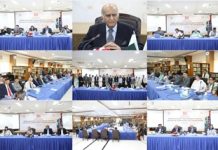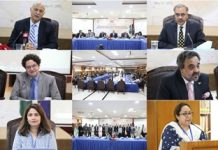Standing up to extremism, and countering terrorism, is a part of liberal values. However, this is simply a political position and does not represent liberalism as an ideology. True liberalism is about constitutionalism; rule of law; popular sovereignty and representative government. And this is an issue at the centre of the political divide in Pakistan
There are serious doubts whether foreign influence in Pakistan’s management of its domestic issues and foreign policy can be disputed any longer. Such influence now covers a wide range of issues, and is exercised quite blatantly, sometimes offensively, instead of with traditional secrecy or diplomatic decorum. Therefore, no one should be shocked to learn that some familiar foreign players are behind the recent political negotiations between President Pervez Musharraf and Benazir Bhutto of the Pakistan People’s Party (PPP).
It is, however, striking (and amusing) how two leaders that constantly attacked each other for seven years going as far as characterising each other as the enemy of the people have been forced to find a common ground in ‘enlightened moderation’. Countries with a strong interest in the evolution of Pakistan’s state and society have found in Musharraf and Bhutto two leaders with the capacity to take Pakistan on the road to progress, modernity and peace. The situation never ceases to amaze.
Clearly, these two leaders fit into the Washington’s foreign policy preferences in the region and beyond. As the United States believes that the fundamental political divide in Muslim countries is between liberal forces and Islamic extremists, any leader or group with a similar political outlook is welcome, and is entitled to US support.
Actually, the anti-terror policy establishment in the US defines ‘liberal’ in the Muslim world, including Pakistan, in a different political category than the way it is defined and understood in the rest of the world. It is a definition shaped by political expediency and by political need for those willing to support the anti-terror agenda. Another important criterion for determining the suitability of allies is the degree of their commitment against Islamist parties and militant outfits. It is an artificial label given to friends and denied to those who might be opposed to US foreign policy.
Standing up to extremism, and countering terrorism, is a part of liberal values. However, this is simply a political position and does not represent liberalism as an ideology. True liberalism is about constitutionalism; rule of law; popular sovereignty and representative government. And this is an issue at the centre of the political divide in Pakistan: the struggle is between democratic forces and an authoritarian establishment that relies on equally authoritarian political elites with feudal, tribal and caste orientations. It is also much easier for the great powers to influence the political process through the establishment and elite political groups that they have depended on for decades.
This is not the first time in Pakistan that there is a visible British and American role in the shaping of our politics, specifically in determining which sections of our traditional elite and the establishment should gain power. While denying that the two powers were playing an up-front mediatory role, Bhutto acknowledged in a recent press conference their keenness on the progress of the talks, and the fact that they are briefed on negotiations between the two leaders. Many wish that Musharraf and Bhutto would be as candid with the people of Pakistan, who have been kept in the dark, as they have been with their foreign ‘observers’. This is why there is so much suspicion surrounding the affair, and several analysts are not wrong in pointing out the personal stakes for both leaders, despite Bhutto’s claims that the sole purpose of these negotiations is a smooth transition to democracy.
There have been instances in the past where these two foreign powers propped up military regimes that they found closer to their regional and global objectives than democratic governments. The difference between the current situation where the country stands on the crossroads of a genuine transition to democracy and the past is in the way our American friends are setting the political discourse and betting on horses that can run their race.
There is greater foreign interest in the politics of Pakistan than before for two reasons. First is the threat of Talibanisation, and the rising power of Islamist groups with a transnational ideological agenda. None of the countries in the neighbourhood of Pakistan, or beyond, would like to see these groups gain enough power to shape Pakistan’s society and state in their image. If that happened, it would have serious consequences for the stability of US-centred regional geopolitics, including the larger Middle East. Americans in the wake of 9/11 have become sceptical of Islamist groups and movements, and tend to believe that the Islamist position cannot be reconciled with notions of civility, peaceful change or harmony with the West. This understanding of Islamist groups might partially explain British and American preference for the Musharraf-Bhutto combination.
The second reason, which is more compelling for the West, and not many Pakistanis wish to debate, is our nuclear capability. Instead of enhancing national sovereignty and providing increased flexibility and autonomy in domestic and foreign affairs, it has subjected us to greater international scrutiny. The West, in the present climate of fear, hostility and suspicion about Islamic radicalism, would not allow Islamist forces to assume political ascendancy through Talibanisation or normal political channels. The bomb that the Islamic parties of Pakistan so emotionally supported has sealed their political fate. Western concern about Islamic parties coming into power even through democratic means is universal, but the interest in preventing them from controlling Pakistan’s nuclear arsenal is greater than ever before.
Western unease about Islamic radicalism and the nuclear bomb might explain why Britain and the United States are so interested in the direction of political change in Pakistan. Pakistan is too important a country, a ‘pivotal state’, to be left alone in choosing its future destiny. In their eyes, religious intolerance, extremism and violence have already exceeded acceptable thresholds.
There are no divisions of opinion between truly liberal sections in Pakistan on the fact that Pakistan needs social reforms, economic development and good governance to regain its capacity to be an effective state and modern society. The difference lies in the choice of strategy. With all due respect for our foreign friends, I think it would be a better choice to support a true transition to democracy in the country. A deal brokered between two leaders with personal political interests in its outcome would be short-lived, and would work against our common interest in achieving a transition to democracy. Western support for a truly democratic political setup in Pakistan is the best step towards defeating Islamic radicalism and militancy.
The author is a professor of Political Science at the Lahore University of Management Sciences.












